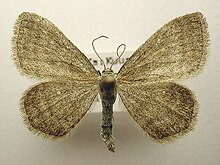Scopula frigidaria
| Scopula frigidaria | |
|---|---|

| |
| Scientific classification | |
| Domain: | Eukaryota |
| Kingdom: | Animalia |
| Phylum: | Arthropoda |
| Class: | Insecta |
| Order: | Lepidoptera |
| Family: | Geometridae |
| Genus: | Scopula |
| Species: | S. frigidaria |
| Binomial name | |
| Scopula frigidaria (Möschler, 1869) | |
| Synonyms | |
| |
Scopula frigidaria is a moth of the family Geometridae. It was described by Heinrich Benno Möschler in 1869.[1] It is found from Fennoscandia to the Kamchatka Peninsula and in northern North America, where it occurs across the boreal forest region, from Alaska across the Northwest Territories and Nunavut to Newfoundland, and in the mountains south to southern Wisconsin, Alberta and British Columbia.
The wingspan is 21–23 millimetres (0.83–0.91 in). Adults are on wing from late May to June in one generation per year.
The larvae feed on Vaccinium myrtillus. Larvae can be found from July to May. It overwinters in the larval stage.
Subspecies
- Scopula frigidaria frigidaria
- Scopula frigidaria schoyeni (Schneider, 1883) (Kola Peninsula, Fennoscandia)
References
- ^ Sihvonen, Pasi (April 1, 2005). "Phylogeny and classification of the Scopulini moths (Lepidoptera: Geometridae, Sterrhinae)". Zoological Journal of the Linnean Society. 143 (4): 473–530. doi:10.1111/j.1096-3642.2005.00153.x.
External links
- "910575.00 – 7166 – Scopula frigidaria – Frigid Wave Moth – (Möschler, 1860)". North American Moth Photographers Group. Mississippi State University. Retrieved November 10, 2020.
- Anweiler, G. G. (2007). "Species Details Scopula frigidaria". University of Alberta Museums. E.H. Strickland Entomological Museum. Retrieved November 10, 2020.
